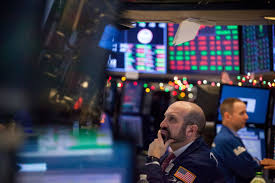Stocks crumble as more nations shut for business to curb virus

Asian shares sank on Monday as a rising tide of national lockdowns threatened to overwhelm policymakers’ frantic efforts to cushion what is likely to be a deep global recession.
In a foretaste of the pain to come, E-Mini futures for the S&P 500 dived 5% at the open to be limit down, while EUROSTOXXX 50 futures tumbled 6.4%.
MSCI’s broadest index of Asia-Pacific shares outside Japan lost 3.8%, with New Zealand’s market shedding a record 10% as the government closed all non-essential businesses.
Shanghai blue chips dropped 2.3%, though Japan’s Nikkei rose 0.8% aided perhaps by expectations of more aggressive asset buying by the Bank of Japan.
There was little to cheer in coronavirus news as the global death toll exceeded over 14,000 with more than 300,000 infections.
Airlines canceled more flights as Australia and New Zealand advised against non-essential domestic travel, the United Arab Emirates (UAE) halted flights for two weeks and Singapore and Taiwan banned foreign transit passengers.
Nearly one in three Americans were ordered to stay home on Sunday to slow the spread of the disease, while Italy banned internal travel as deaths there reached 5,476.
U.S. President Donald Trump went on TV to approve disaster deceleration requests from New York and Washington, while St. Louis Federal Reserve President James Bullard warned unemployment could reach 30% unless more was done fiscally.
Analysts are dreading data on weekly U.S. jobless claims due on Thursday amid forecasts they could balloon by 750,000, and maybe by more than a million.
U.S. stocks have already fallen more than 30% from their mid-February peak and even the safest areas of the bond market are experiencing liquidity stress as distressed funds are forced to sell good assets to cover positions gone bad.
WAITING ON THE DISEASE
“It would be a brave, or foolish, man to call the bottom in equities without a dramatic medical breakthrough,” said Alan Ruskin, head of G10 FX strategy at Deutsche Bank.
Also needed would be evidence that China could re-emerge from the pandemic without reigniting infections, and that other major economies had hit inflection points for infection rates, he added.
“Even were social distancing to subside at the earliest plausible dates in Europe and the U.S., it will have done extraordinary damage to confidence in a host of key sectors,” Ruskin said.
The mounting economic toll led to a major rally in sovereign bonds late last week, with efforts by central banks to restore liquidity in the market allowing for more two-way trade.
Yields on the benchmark U.S. 10-year note were down at 0.80%, having dived all the way to 0.84% on Friday from a top of 1.28%.
In New Zealand, the central bank announced its first outright purchase of government paper aiming to inject much-needed liquidity into the local market.
In currency markets, the first instinct on Monday was to dump those leveraged to global growth and commodity prices, sending the Australian dollar down 0.8% to $ 0.5749.
The U.S. dollar started firm but took a step back after partisan battles in the U.S. Senate stopped a coronavirus response bill from advancing.
The dollar eased 0.5% to 110.23 yen, while the euro recouped losses to be up 0.1% at $ 1.0707.
Against a basket of currencies the dollar was still a fraction firmer at 102.510.
The dollar was a major gainer last week as investors fled to the liquidity of the world’s reserve currency, while some funds, companies and countries desperately sought more cash to cover their dollar borrowings.
“Further dollar strength would not be helpful for the U.S. or global economies, and in our view policymakers should consider direct intervention, in addition to further enhancements to central bank USD liquidity facilities,” said analysts at Goldman Sachs in a note.
“We expect the dollar to remain firm against most crosses until policymakers intervene and/or market conditions begin to stabilize.”
The steady rise in the dollar undermined gold, which slipped 0.3% to $ 1,493.83 per ounce.
Oil prices turned mixed after opening sharply lower. Brent crude futures slipped 69 cents to $ 26.29 a barrel, while U.S. crude gained 30 cents to $ 22.93.





